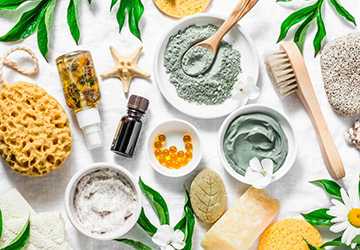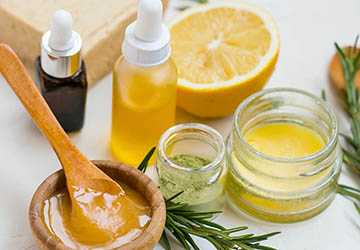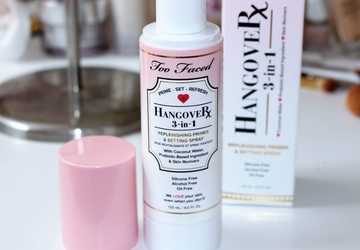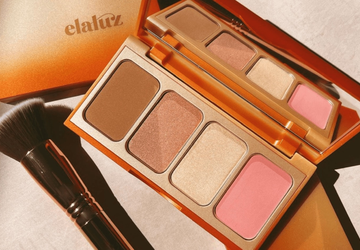Natural Beauty Products: Benefits and Choices
What do trends like Korean glass skin or 'minimalism' have in common? They all have geared the beauty community towards organic and natural beauty products. According to a survey by ProdegeMR, a whopping 34% of responding consumers said they preferred to purchase organic or natural skincare products. Celebrities are swearing for natural beauty products, from Gwenyth Paltrow's clean living to Emma Watson's dedication to sustainability.
But why? Is it just a fad, or are there real benefits to ditching the chemicals and embracing nature's bounty for your beauty routine? Buckle up because, in this blog post, we'll explore the fascinating world of natural beauty products, the science behind their effectiveness, and the exciting choices available to make your skin glow—naturally!

The Allure of Natural Beauty Products
The best natural beauty products are formulated with natural ingredients, often undergoing minimal processing to retain their inherent benefits. These ingredients can come from plants (botanicals), minerals, or bee products like beeswax. Unlike conventional products, natural formulations avoid harsh chemicals, synthetic fragrances, and dyes. The focus lies on using raw materials in their purest form, allowing the natural properties of the ingredients to shine through.
There are several compelling reasons why you might consider switching to a natural routine:
Gentler Touch
Conventional beauty products often contain a cocktail of synthetic ingredients like sulfates, parabens, and artificial fragrances. While these may enhance shelf life or create a pleasant scent, they can also be harsh on the skin. On the other hand, natural products rely on ingredients that are less likely to disrupt the skin's delicate barrier. This is especially beneficial for sensitive skin prone to irritation, redness, or dryness. Natural ingredients for beauty products like aloe vera are gentle on the skin and ideal for all skin types.
Potential for Fewer Side Effects
Many synthetic chemicals in conventional products can trigger allergic reactions or other side effects. These can range from mild itching and redness to severe breakouts and even eczema. Natural products, while not entirely free of potential allergens (think nut-based oils), generally contain fewer ingredients with a known history of causing reactions. Natural ingredients often have anti-inflammatory properties that help calm irritation and promote skin health.
Sustainable Practices
The beauty industry has a significant environmental footprint. Many conventional brands rely on ingredients grown with harsh pesticides and fertilizers, leading to soil degradation and pollution. Additionally, the production process can generate substantial waste and carbon emissions. Natural beauty brands, on the other hand, often prioritize eco-friendly practices. They might use organic ingredients grown without harmful chemicals, which benefits your skin and reduces environmental impact. Additionally, many natural brands use recyclable packaging and implement sustainable production methods, making your beauty choices more Earth-conscious.
Potentially More Effective
Natural products often focus on botanical extracts, essential oils, and carrier oils rich in vitamins, antioxidants, and other beneficial compounds. These ingredients target specific concerns like dryness, wrinkles, or acne. For instance, shea butter provides deep hydration, while green tea extract protects against environmental damage with its antioxidant properties.

Demystifying Natural Beauty Ingredients
The benefits of natural beauty products are plentiful, but knowing the right ingredients can feel overwhelming. Let's break down some popular natural ingredients and their essential functions:
● Carrier Oils (e.g., jojoba, coconut): These oils mimic the skin's natural sebum, providing excellent moisturization without clogging pores. Jojoba oil is exceptionally lightweight and absorbs quickly, while coconut oil offers a richer texture for dry skin.
● Essential Oils (e.g., lavender, tea tree): These concentrated plant extracts pack a punch of aromatherapy benefits. Lavender oil gives a soothing effect, while tea tree oil has antiseptic qualities, making it beneficial for acne-prone skin.
● Clays (e.g., kaolin, bentonite): These fine-grained powders act as deep cleansers, drawing out impurities and excess oil. Kaolin clay is gentler and ideal for sensitive skin, while bentonite clay is a powerful detoxifier for oily or congested skin.
● Butter (e.g., shea, cocoa): Luxuriously rich and nourishing, butter is a godsend for dry skin. Shea butter provides deep hydration and is known for its anti-inflammatory properties. Cocoa butter melts on contact with the skin, offering a rich emollient effect.
● Botanical Extracts (e.g., aloe vera, green tea): Packed with antioxidants and vitamins, these extracts soothe, protect, and improve skin health.
Making Natural Beauty Choices
Now that you know the benefits of natural skincare, it’s time to incorporate these products into your skincare routine. These steps will help you out:
Know Your Skin
The foundation of any successful beauty routine lies in understanding your unique skin type. Are you prone to dryness, oiliness, or a combination of both? Do you struggle with acne, sensitivity, or wrinkles? Understanding your skin's needs allows you to target your choices effectively.
● Dry Skin: Look for natural products rich in hydrating ingredients like shea butter and hyaluronic acid. Opt for gentle cleansers and avoid harsh, stripping ingredients.
● Oily Skin: Choose lightweight, non-comedogenic (won't clog pores) products. Clay masks and cleansers with kaolin or bentonite clay can help absorb excess oil.
● Combination Skin: Finding a balance is critical. Look for gentle cleansers and moisturizers formulated for combination skin. Consider using a hydrating toner to balance oil production.
● Sensitive Skin: Opt for fragrance-free and hypoallergenic products. Soothing ingredients like aloe vera, calendula, and chamomile can help calm irritation.
● Acne-Prone Skin: Look for natural ingredients with antibacterial properties, such as tea tree oil (diluted) and salicylic acid (derived from willow bark). Opt for non-comedogenic moisturizers and gentle cleansers.
● Mature Skin: Antioxidants like green tea extract and vitamins C & E are your allies. Choose products that promote collagen production and address concerns like wrinkles and loss of elasticity.
Research and Read Labels
Once you understand your skin type and concerns, it's time to research natural beauty products. Here are some key points to remember:
● Ingredient List: This is your friend! Look for products with recognizable natural ingredients that are high on the list (indicating higher concentration). Research unfamiliar ingredients to ensure they align with your needs and sensitivities.
● Certifications: While not guaranteed quality, certifications like USDA Organic can offer peace of mind.
● Reviews and Recommendations: Look for reviews from people with similar skin types and concerns. Beauty bloggers and influencers can also offer valuable insights. However, remember to approach recommendations with a critical eye.
Start Simple and Patch Test
Building a natural beauty routine requires patience and experimentation. Resist the urge to overhaul your entire skincare shelf at once. Here's how to introduce new products:
● Start with one or two products: This allows you to identify potential irritants or sensitivities.
● Patch Test: Before applying any new product to your entire face, apply a small amount to your inner arm and monitor for 24 hours.
● Introduce Gradually: Once a product passes the patch test, introduce it slowly into your routine. Avoid potential purging (temporary breakouts) when switching from conventional to natural products.
Wrapping Up
Feel free to experiment with different products; remember, patience goes a long way. Your skin might need some time to adjust to the natural goodness, so keep calm and patch test on!







